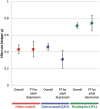Is psychotherapy effective? A re-analysis of treatments for depression
- PMID: 30058524
- PMCID: PMC6998909
- DOI: 10.1017/S2045796018000355
Is psychotherapy effective? A re-analysis of treatments for depression
Abstract
AimsThe aim of this study was to reanalyse the data from Cuijpers et al.'s (2018) meta-analysis, to examine Eysenck's claim that psychotherapy is not effective. Cuijpers et al., after correcting for bias, concluded that the effect of psychotherapy for depression was small (standardised mean difference, SMD, between 0.20 and 0.30), providing evidence that psychotherapy is not as effective as generally accepted.
Methods: The data for this study were the effect sizes included in Cuijpers et al. (2018). We removed outliers from the data set of effects, corrected for publication bias and segregated psychotherapy from other interventions. In our study, we considered wait-list (WL) controls as the most appropriate estimate of the natural history of depression without intervention.
Results: The SMD for all interventions and for psychotherapy compared to WL controls was approximately 0.70, a value consistent with past estimates of the effectiveness of psychotherapy. Psychotherapy was also more effective than care-as-usual (SMD = 0.31) and other control groups (SMD = 0.43).
Conclusions: The re-analysis reveals that psychotherapy for adult patients diagnosed with depression is effective.
Keywords: Depression; Eysenck; meta-analysis; natural history; psychotherapy effectiveness.
Figures

Comment in
-
Psychotherapie: Wirksam oder nicht?Psychother Psychosom Med Psychol. 2019 Jan;69(1):5. doi: 10.1055/a-0720-0943. Epub 2019 Jan 7. Psychother Psychosom Med Psychol. 2019. PMID: 30616260 German.
-
Let’s Distinguish Relative and Absolute Efficacy to Move Psychotherapy Research Forward.Z Psychosom Med Psychother. 2019 Jun;65(2):178-182. doi: 10.13109/zptm.2019.65.2.178. Z Psychosom Med Psychother. 2019. PMID: 31154927 German.
Comment on
-
Was Eysenck right after all? A reassessment of the effects of psychotherapy for adult depression.Epidemiol Psychiatr Sci. 2019 Feb;28(1):21-30. doi: 10.1017/S2045796018000057. Epub 2018 Feb 28. Epidemiol Psychiatr Sci. 2019. PMID: 29486804 Free PMC article.
References
-
- Ahola P, Joensuu M, Knekt P, Lindfors O, Saarinen P, Tolmunen T, Valkonen-Korhonen M, Jääskeläinen T, Virtala E, Tiihonen J and Lehtonen J (2017) Effects of scheduled waiting for psychotherapy in patients with major depression. Journal of Nervous and Mental Disease 205, 611–617. - PubMed
-
- Armento ME (2012) Behavioral activation of religious behaviors: treating depressed college students with a randomized controlled trial (Doctoral Dissertation). University of Tennessee, Knoxville.
-
- Baskin TW, Tierney SC, Minami T and Wampold BE (2003) Establishing specificity in psychotherapy: a meta-analysis of structural equivalence of placebo controls. Journal of Consulting and Clinical Psychology 71, 973–979. - PubMed
-
- Benedetti F (2014) Placebo effects: Understanding the mechanisms in health and disease, 2nd Edn. New York, NY, US: Oxford University Press.
Publication types
MeSH terms
LinkOut - more resources
Full Text Sources
Other Literature Sources
Medical
Miscellaneous

